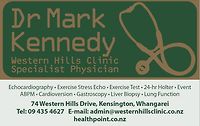Dr Mark Kennedy
Western Hills Clinic
74 Western Hills Drive
Kensington
Whangarei 0112

Dr Mark Kennedy - Private Internal Medicine Specialist

Postal Address
Contact Details
Phone (09) 435 4627, or if URGENT, Linda Clinical Nurse Specialist 021 689 447 outside of clinic hours
Mobile Emergency Phone (021) 702 395
Email admin@westernhillsclinic.co.nz
Healthlink EDI: west74hc
For any urgent Echocardiogram, Exercise Stress Echocardiogram or Exercise Tolerance Test, contact Clinical Nurse Specialist (Linda) on (09) 435 4627 on Tuesday and Thursday (or 021 689 447 outside those days). If she is unavailable and it is URGENT, call Mark Kennedy on (021) 702 395. We can undertake Transthoracic Echocardiograms most weekdays.
Electrical Cardioversion
Patient information:
Electrical cardioversion is a procedure used to correct rhythm abnormalities of the heart, in which a small electric shock is used to "jolt" the heart back into a normal rhythm. The procedure is usually undertaken for the common rhythm disturbances, atrial fibrillation and atrial flutter. If the abnormal rhythm has been present for more than 48 hours, the patient will usually be treated with Dabigatran or Warfarin (an anticoagulant, or "blood thinner") for at least 3 weeks prior to a cardioversion. This is to ensure that there is no blood clot in the heart, which could be released into the circulation by the cardioversion causing a significant problem, such as a stroke. Sometimes a transoesophageal echo may be performed immediately before a cardioversion to exclude the presence of any blood clot inside the heart.
Medicines are often given to hold the rhythm stable when there is a successful cardioversion. Blood thinning with Dabigatran or Warfarin is required to reduce the risk of clotting and stroke for an interval both before and following the procedure. Electrical cardioversion has a high immediate success rate, and is a low risk procedure.
The procedure is performed under a short general anaesthetic, and the patient must fast for 4 - 6 hours before the procedure. The shock is delivered through electrode pads placed on the chest and back. Up to 3 shocks may be given in an attempt to restore the heart's natural rhythm (sinus rhythm).
After the procedure:
Following cardioversion the patient is monitored for approximately one hour, and should not drive for 24 hours. A report will be sent to the referring doctor or GP, and the cardiologist performing the procedure will explain ongoing treatment and medication to you. If you have been on Dabigatran or Warfarin, it is important to continue this, usually for at least 4 weeks after the cardioversion. This will be discussed at your follow-up visit in 4 weeks' time.
On occasions cardioversion can be repeated if the rhythm disturbance recurs.
https://www.healthpoint.co.nz/private/internal-medicine/dr-mark-kennedy-private-internal-medicine/